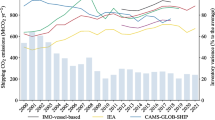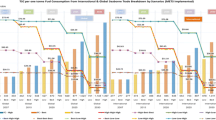Abstract
The purpose of this paper is to present an analysis of carbon dioxide (CO2) emissions of the world commercial fleet. The analysis is based on the Lloyds-Fairplay world ship database for 2007 and produces various emissions statistics of the following major ship types: bulk carriers, crude oil tankers, container vessels, product/chemical carriers, LNG carriers, LPG carriers, reefer vessels, Ro-Ro vessels and general cargo ships. A separate analysis is carried out for small vessels under 400 GRT and for passenger vessels. The main outputs from this analysis for each ship type-size bracket are the emitted grams of CO2 per tonne-km and an estimate of the total CO2 produced in a year. The methodology for estimating these statistics is described, and a comparison with other studies is made.
Similar content being viewed by others
References
Buhaug, Ø., J. J. Corbett, Ø. Endresen, V. Eyring, J. Faber, S. Hanayama, D. S. Lee, et al. 2008. Updated Study on Greenhouse Gas Emissions from Ships: Phase I Report. International Maritime Organization (IMO) (includedasAnnexindocument ME-PC58/INF. 6)
Corbett, J. J., and H. W. Köhler. 2003. Updated emissions from ocean shipping.Journal of Geophysical Research 108(D20) 4650.
-. 2004. Considering alternative input parameters in an activity-based ship fuel consumption and emissions model: Reply to commentby Øyvind Endresenetal. on ’Updated emissions from ocean shipping.Journal of Geophysical Research 109 (D23303).
Endresen, Ø., E. Sørgard, J. K. Sundet, S. B. Dalsøren, I. S. A. Isaksen, T. F. Berglen, and G. Gravir. 2003. Emission from international sea transportation and environmental impact.Journal of Geophysical Research 108(D17) 4560.
Endresen, Ø., E. Sørgard, J. Bakke, and I.S.A. Isaksen. 2004a. Substantiation of a lower estimate for the bunker inventory: Comment on ‘Updated emissions from ocean shipping’ by James J. Corbett and Horst W. Köhler.Journal of Geophysical Research. 109(D23302).
Endresen, Ø., E. Sørgård, H. L. Behrens, P. O. Brett, and I.S.A. Isaksen. 2007. A historical reconstruction of ships fuel consumption and emissions.Journal of Geophysical Research 112(D12301).
EMEP/CORINAIR. 2002. EMEP Co-operative Programme for Monitoring and Evaluation of the Long Range Transmission of Air Pollutants in Europe, The Core Inventory of Air Emissions in Europe (CORINAIR), Atmospheric Emission Inventory Guidebook, 3rd edition, October.
EnSys. 2007. Analysis of impacts onglobal refining & CO2 emissions of potential MARPOL regulations for international marine bunker fuels. EnSys Energy & Systems.
Eyring, V., H.W. Köhler, J. van Aardenne, and A. Lauer. 2005. Emissions from international shipping: 1. The last 50 years.Journal of Geophysical Research 110(D17305).
International Maritime Organization (IMO). 2000. Study of Greenhouse Gas Emissions from Ships. Study by Marintek, Econ Centre for Economic Analysis, Carnegie Mellon University and DNV.
-. 2007a. Input from the four subgroups and individual experts to the final report of the Informal Cross Government/Industry Scientific Group of Experts. Note by the Secretariat, BLG 12/INF.10.
-. 2007b. Report on the outcome of the Informal Cross Government/Industry Scientific Group of Experts established to evaluate the effects of the different fuel options proposed under the revision of MARPOL Annex VI. Note by the Secretariat. BLG 12/6/1.
-. 2008a. Future IMO regulation regarding green house gas emissions from international shipping. Submitted by Denmark, Marshall Islands, BIMCO, ICS, INTERCARGO, INTERTANKO and OCIMF.MEPC 57/4/2.
-. 2008b. Report of the Drafting Group on amendments to MARPOL Annex VI and the NOx Technical Code. MEPC 58/WP.9.
-. 2008c. Report of the Working Group on Greenhouse Gas Emissions from Ships. MEPC 58/WP. 8.
IPCC. 2006. IPCCGuidelines for National GreenhouseGasInventories. National Green-house Gas Inventories Programme. Available online at http://www.ipcc-nggip.iges.or.jp/public/2006gl/.
Lloyd’s Fairplay Ship Database. 2007. Lloyds Maritime Information Services.
Maersk Line. 2007. Brochure “Constant Care for the Environment”. Available at http://www.maerskline.com/globalfile/?path=/pdf/environmental_brochure
Psaraftis, H.N., and C. A. Kontovas. 2008. Ship Emissions Study. National Technical University of Athens. Report to Hellenic Chamber of Shipping, May. Available online at http://www.martrans.org/emis/emis.htm.
UNFCC. 1997. Kyoto Protocolto the United Nations Framework Convention on Climate Change. Available online at http://unfccc.int/resource/docs/convkp/kpeng.htm.
Author information
Authors and Affiliations
Corresponding author
Rights and permissions
About this article
Cite this article
Psaraftis, H.N., Kontovas, C.A. CO2 emission statistics for the world commercial fleet. WMU J Marit Affairs 8, 1–25 (2009). https://doi.org/10.1007/BF03195150
Issue Date:
DOI: https://doi.org/10.1007/BF03195150




